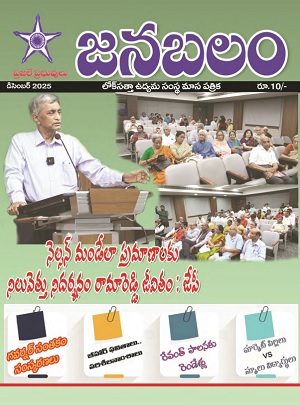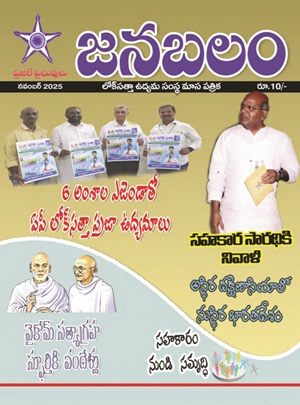The Lok Satta Party today charged Union Communications Minister Kapil Sibal with indulging in legal nitpicking in claiming that the Government had not suffered any loss in 2-G spectrum allocation. By resorting to quibbling like a petty advocate, the Government of a mighty country is becoming the butt of international ridicule.
Lok Satta Party leaders Katari Srinivasa Rao, G. Raja Reddy, P. Bhaskara Rao and V. Vijayendar Reddy were addressing media in the context of the Supreme Court admitting a public interest litigation petition filed at the behest of the Lok Satta seeking cancellation of the tainted 2 G spectrum licenses.
The Lok Satta leaders said that Mr. Kapil Sibal was trying to defend the indefensible. How could a responsible Union Minister turn a Nelson’s eye to the Comptroller and Auditor General’s report on the presumptive loss to the exchequer? The CAG estimated the loss ranged between Rs.55,000 crore and Rs. 1,76,000 crore going by three parameters – the amounts paid by the licensees to the Government and the amounts for which some of them sold them within weeks without any value addition, the revenue derived in 3 G spectrum auction and the solid offers made by some unsuccessful applicants.
The Lok Satta leaders demanded that Mr. Kapil Sibal own up his predecessor A. Raja’s capricious spectrum allocation, cancel the licenses forthwith, and call for transparent, competitive bidding.
There is a precedent for cancellation of such tainted deals, the Lok Satta leaders said. They recalled that the Government of India cancelled the deal to buy 197 Eurocopters from EADS after the Vigilance Commission had faulted the bidding process.
The Lok Satta leaders charged the Government of India with sitting on reports submitted by the Administrative Reforms Commission and others to rid the Government of systemic ills. In contrast, Prime Minister Lal Bahadur Shastry, a man of unimpeachable integrity and resolute will, lost no time in implementing the Santhanam Committee recommendations on corruption. Within a few months of receiving the report, the then Union Government created the Central Vigilance Commission, paved way for constitution of vigilance commissions in States, strengthened vigilance departments, brought Ministers under the purview of the Prevention of Corruption Act and amended rules governing all India and central service employees. (Today happens to be the death anniversary of Mr. Lal Bahadur Shastry).
The Lok Satta leaders said the series of scams that rocked the nation in the recent past called for resolute action, and not legalistic contortions and distortions.
Dr. JP took the initiative and roped in some prominent civil society organizations and individuals of impeccable integrity to file the writ petition (WPC No. 423/2010) in the Supreme Court.
The petitioners contended that the grant of 2 G licences was marred by multiple illegalities, irregularities, corruption, and favoritism. They wanted the Supreme Court to direct the Government to take back the allocated spectrum and auction it. In addition, they sought imposition of punitive damages on companies that made false declarations or violated their undertakings to the Government.
They pointed out that in most legal systems transactions tainted by bribery/corruption or made in violation of established norms and procedures are considered illegal and unenforceable.
The others petitioners are: Mr. J. M. Lyngdoh, Mr. T. S. Krishnamurthy and Mr. N. Gopalaswami, all former Chief Election Commissioners, Mr. P Shankar, former Central Vigilance Commissioner, Mr. Julio F. Ribeiro, former Director of General of Police, Gujarat and Punjab, Mr. Paranjoy Guha Thakurta, senior journalist, Admiral Tahiliani, former Governor, Chief of Naval Staff and Chairperson of Transparency International India, Common Cause, Telecom Watchdog, and Centre for Public Interest Litigation.
Tuesday, January 11, 2011
Stop quibbling and take action, Lok Satta tells Sibal
Subscribe to:
Post Comments (Atom)





No comments:
Post a Comment